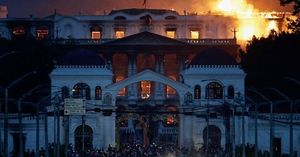A new and concerning outbreak of Disease X has emerged from the Democratic Republic of the Congo (DRC), capturing the attention of public health officials and scientists around the world. This term, 'Disease X', refers to a pathogen not yet identified but has the potential to cause significant illness and even fatalities.
According to the World Health Organization (WHO), the term is utilized to denote diseases caused by pathogens capable of rapid spread and severe impact on health systems. The DRC’s recent surge of cases has become the focal point of discussions surrounding global health security.
Health authorities reported the first cluster of symptoms reminiscent of previous viral outbreaks seen in the region last month. Residents began to exhibit symptoms including fever, fatigue, and gastrointestinal distress, leading to swift investigations by health officials. To date, the exact pathogen causing this outbreak remains unidentified, but investigations are racing forward to put containment measures in place.
Local hospitals have ramped up patient screening and initiated contact tracing measures. Health workers are well aware of the potential consequences, drawing on lessons learned from past Ebola ravages. Some community members are echoing those sentiments, voicing fears of another epidemic.
“We’ve seen it before,” says Dr. Marie Ngoya, head of the regional health department. “When diseases like this arise, they can spread so quickly. It’s not just about identifying the illness; it’s about protecting the population.”
The current state of health infrastructure poses challenges; the DRC has faced long-standing issues with lack of resources and healthcare personnel. Countries around the region have begun offering support, including medical supplies and assistance from international medical teams. Organizations like Médecins Sans Frontières (Doctors Without Borders) have mobilized to provide humanitarian support, ensuring the local healthcare systems do not crumble under added pressure.
“This is not just the responsibility of the Congo; it’s something we all need to tackle together as a global community,” highlights Dr. Helen Rees, who has extensively studied outbreaks across Africa. “Collaboration is key. If Disease X can find its way here, it can travel anywhere—swiftly.”
While the international community watches closely, it raises questions about preparedness levels for potential pandemic threats. Vaccination and rapid deployment of diagnostic tools can make all the difference. The past years' experiences with virus containment during the COVID-19 pandemic have prompted some countries to reevaluate their health response strategies.
Meanwhile, health experts are advocating for enhanced surveillance systems. This could play a significant role, acting as the first line of defense against the spread of unidentified diseases. Timely reporting coupled with technological advancements can help epidemiologists connect the dots much quicker than before.
Understanding pathways of transmission is pivotal; as the outbreak escalates, the DRC’s healthcare system is burdened with the responsibility of identifying potential vectors. Recent media coverage shows efforts to advise the public on hygiene practices and staying alert for symptoms, amplifying the message about infectious diseases’ draconian impact.
Dr. Ngoya contemplates this element of education: “It’s armoring our communities with knowledge. When everyone understands how to protect themselves and others, it changes the game.”
On the ground, community health volunteers are stepping up, engaging with families to disseminate key information about prevention strategies. They are assisting with health education sessions, ensuring the populace stays informed about what to look for should symptoms appear.
The updates from public health authorities provide little relief though. With patients exhibiting symptoms across multiple villages, containment efforts face geographic and logistical obstacles. The DRC, with its rivers and thick forests, presents unique transport challenges for healthcare delivery, hampering the response team’s efforts.
“Movement within the territories can be slow and dangerous,” says Victor Malumba, who coordinates relief efforts regionally. “We need every resource at our disposal to make it happen.”
Reportedly, vaccination trials for Disease X are underway, which might offer long-term solutions when the particulars of the disease are fully understood. Still, the urgency of the present situation is apparent, as authorities learn to balance the immediate care of affected individuals and longer-term prevention efforts.
Community responses have varied; fears of transmission often result in some showing reluctance to seek medical assistance. Trust between healthcare providers and the communities remains delicate, as misinformation can quickly spread alongside any disease.
This situation has prompted local governments to take proactive measures. Training programs have been instituted for healthcare workers to connect with community leaders, bridging gaps of communication and enhancing mutual trust.
“We must not only focus on the disease but also the people affected by it. Education is empowerment - when communities understand what is happening, they engage differently,” explains Malumba.
Analysts now speculate how this outbreak might affect the upcoming flu season, what with the healthcare system potentially being stretched thin already. Disease X may compound existing issues, but experts are also hopeful about the partnerships being formed now to manage the crisis.
The international medical community is on high alert, many perking ears on the DRC’s situation. Preparedness plans suggest many countries are now risking future outbreaks will be less severe than past incidents due to swift response protocols being established.
While the DRC mobilizes to tackle this challenge, it’s imperative to monitor global health trends as interconnectedness seems to determine who encounters the next big outbreak. Creating networks across borders becomes even more urgent as scientists push for faster identification of pathogens and the development of necessary treatment plans.
For now, the world watches closely. A crisis looms on the horizon, invoking lessons from history, reminding us all just how fragile our interconnected world can be.



